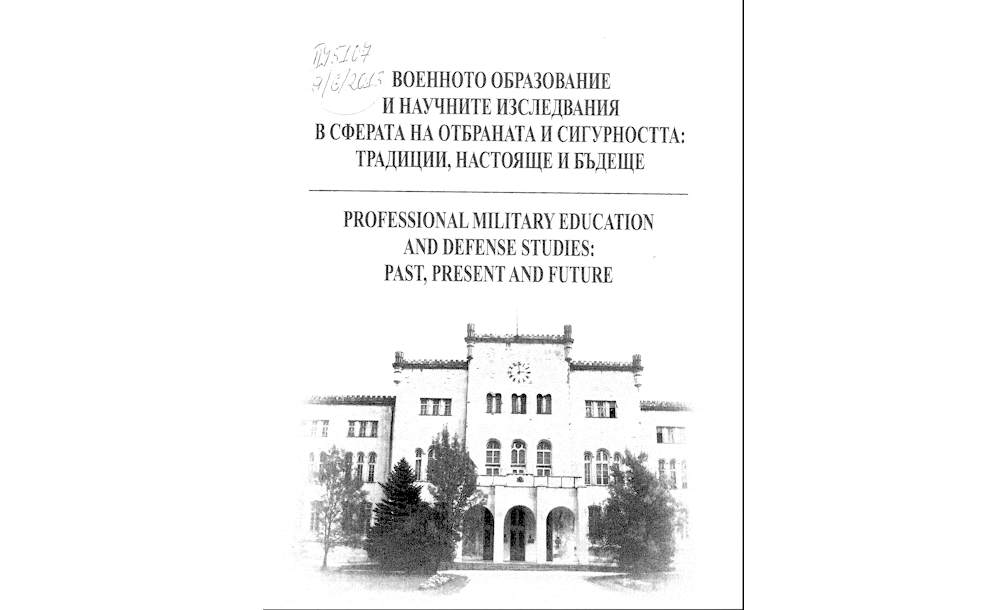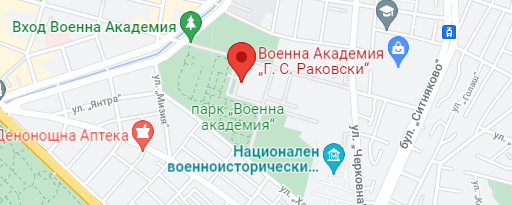В76
ВОЕННОТО образование и научните изследвания в сферата на отбраната и сигурността : традиции настояще и бъдеще = Международна научна конференция, посветена на 100 годишнината на Военна академия : Profesional Military Education and Defense Studies : Past, Present and Future ; Под.ред. Янцислав Янакиев. - София : Военна академия "Г.С.Раковски", 2012. - 311 с. ; 22 см.
ISBN: 978 954 9348 35 4 : 25.55 лв.; УДК: 327.5:355.013
Аналитично описание:
- АНГЕЛОВ, Аню. Военното образование и научните изследвания в сфера. с. 10-14
- АНГЕЛОВ, Димитър. ВА "Г.С. Раковски"-военното образование и науч. изследвания. с. 15-21
- АТКИНСЪН, Карол. Историята и значението на чуждестранните студенти. с. 171-176
- БАЕВ, Йордан. Ролята на Консорциума на Военните академии. с. 56-65
- БАЛЕ, Холгер. Интелигентната отбрана. с. 39-43
- БАХЧЕВАНОВ, Георги. Предизвикателства и перспективи пред образованието. с. 201-208
- БОГДАНОВ, Борис. Ролята на факултет "Национална сигурност и отбрана. с. 230-236
- ВАСИЛЕВА, Светлана и др. Симулационно моделиране в преподаването. с. 237-247
- ГАГЪМОВА, В. Румен Иванов. Възможност за кибератака чрез нерегламентирано пуб. с. 311-325
- ГАНЕВА, Зорница. Сравнителен анализ на националната идентичност. с. 76-93
- ГЕОРГИЕВА, Теодора. Матанализ на изследванията на качеството на обучен. с. 271-287
- ГОЦЕВ, Георги. Защита на общественият ред като фактор за. с. 125-137
- ДОНЧЕВ, Александър и др. Система за колективна сигурност. с. 288-295
- ЙОВАНОВСКИ, Зоран. Използване на оперативната техника в борбата. с. 184-188
- ЙОРДАНОВ, Сашо, Данчо Дяков. Военна полиция-актуални аспекти на бойно-. с. 153-159
- КАРЕВ, Максим. Операционният анализ - фактор за развитие. с. 222-229
- КАРЕВА Румяна и др. Българският комуникативен стил. с. 104-116
- МАРКОВ, Захарин. Професионалното военно образование. с. 177-183
- МИЛЧАНОВСКИ, Мациеж. Военното образование пред нови предизвикателства. с. 117-124
- МИЧЕВ, Стефан. Манталитетната програма-една от целите. с. 143-148
- ПЕТРОВ, Тодор. Научноизследователската дейност във ВА преди 1944. с. 48-55
- ПИВОВАРОВ, Владимир. Отрицателни последствия за сигурността. с. 248-253
- САРАНОВИЧ, Йорданка и др. Сръбският опит в образованието на. с. 94-103
- СКАРПЕЙТ, Джери и др. Институтът "Управление на програмата за равни възможности. с. 66-75
- СПАСОВ, Светослав. Ролята на висшите военни училища като НИЦ. с. 22-38
- СТАНЧЕВ, Станчо. Приносът на ВА за подготовка на военния елит. с. 44-47
- СТОЙЧЕВ, Кирил. Национални приоритети и мястото на България в. с. 160-170
- СЪБЕВ, Съби. Нагласи и възприятия на част от офицерския състав. с. 254-270
- ТОПОР, Сотин. Изводи относно спазването на човешките права. с. 189--200
- ТЪРКАЛАНОВ, Юрий. Нови измерения на стратегическото предимство. с. 149-152
- ЦВЕТКОВ, Цветан. Възможности за усъвършенстване на системата за дис. с. 209-231
- ЧЕРНЕВА, Бойка. Стокхолмската програма на ЕС. с. 138-142
ЯНАКИЕВ, Янцислав. Взаимодействие в/у военнослужещи от различни нации. с. 296-310
Dimitrov, Peter. Knowledge Management and Lessons Learned: A Prerequisite for Enhancing Defense Capabilities. pp. 448-456
Knowledge Management and Lessons Learned: A Prerequisite for Enhancing Defense Capabilities
Peter Dimitrov, PhD
This article deliberates on necessary preconditions for a military organization to transform to a learning organization in order to answer the demands of current operating environment. It scrutinizes Knowledge management in the light of classic theories as well as its implementation in military ranks and files. It also offers some Lessons Learned postulates and proposes limited results that came out of a survey conducted with military personnel from the Bulgarian Armed Forces.
Before starting with my basic points, I would like to deliberate on some global challenges that we all face in contemporary operating environment. Today we experience the effects of global change in all aspects of life. We encounter globalization, uncontrollable technological advances in almost all fields of life, increased industrial production that brings about environmental degradation and world natural resources depletion. In the background of this grim picture we are experiencing widespread financial crisis that degrades way of living and causes social unrest.
All mentioned above requires development of prudent strategies how to cope with the global change. Change has compelled organizations worldwide to adjust to global competitive environment in order to adapt, survive and succeed in the new millennium. Organizations today ought to learn fast to remain in the market or otherwise they will go bankrupt. Like corporate business, the Armed Forces will also have to adopt a learning culture, to answer the demands of global geopolitical environment. More clearly said military will need to transform their rank and files into learning organizations. Thus they will stay attractive as workplaces where unique and fulfilling learning opportunities present incentives for people to stay committed to the Armed Forces.
At the same time we are witnessing a fundamental change in type and scale of the ubiquitous and never-ending conflict. Global change has changed nature of threat as well. Nowadays we witness asymmetric threats like international terrorism, and religious extremism, cyber threats, proliferation of WMD, and many others. This is another raison d'etre for the military to change and learn how to be successful in neutralizing these threats.
The question is: HOW DO WE COPE WITH CHANGE?
One of the answers may be: By adapting to change through creating favorable conditions for our military organizations to transform into fully-fledged learning organizations, where everybody contributes to creation, acquisition, exchange and application of new knowledge into military practice.
In order to cope with all those threats NATO has adopted a new strategic concept that laid the foundation of new security paradigm. In this concept a considerable attention has been paid to management of military knowledge. To this end, at the Chicago Summit last month the allies stated that NATO would continue to pay significant attention to Lessons learned from recent operations.



